Why is the False Bay region important for the conservation of sharks?
False Bay is home to a large proportion of the Southern Africa white shark population that depend on it for a source of food, whether it be Cape fur seals, fish or other species of sharks. Seal Island provides a stable source of food for them in an environment that can be harsh and difficult to find food in. In summer months there is also available food such as schools of yellowtail, geelbek, soupfin and smooth hound sharks. A large white shark needs to eat 1 seal pup or the equivalent every 3 days just to stay alive, more if they want to grow and reproduce.
What is the environmental importance of having sharks in the bay?
White sharks feed at the top of the food chain and they feed on a variety of prey from squid, to fish and other sharks to seals, dolphins and even scavenge on dead whales. As a result they impact these species in two main ways: they have a direct impact on prey abundance and indirectly they impact prey behaviour e.g. prey will spend a lot of time trying to avoid being eaten, and the combination of these two effects means that white sharks play a regulatory role in our bay, influencing ecosystem structure and function. The presence of sharks, especially those at the top of the food chain are a sign that there is enough food to support them, which suggests a relatively healthy ecosystem. In areas e.g. some coral reefs where sharks have been fished out, the ecosystem is less bio diverse and less healthy. Thus, having sharks in the bay is actually a good sign for our ecosystem.
What can the public to do aid shark conservation efforts?
There are many species of sharks and rays in Cape Town, especially False Bay. Some of them are commercially exploited e.g. soupfin sharks, smooth hound sharks and bronze whalers, others are caught in recreational catch and release e.g. ragged tooth sharks, sevengill sharks and others are important for eco-tourism e.g. white shark, sevengill sharks and various cat shark species. These are therefore all impacted by people on some level. Therefore, there are a range of ways an ordinary person can contribute to conservation.
- Only eat fish and shark from sustainable fisheries. The SASSI guide can help people make informed decisions.
- Practice responsible catch and release fishing.
- Write letters to your politicians urging them to conserve sharks and rays
- Choose a responsible tour operator to go shark diving
- Educate your friends and family about sharks, one of the biggest problems is fear and misconception which are obstacles in getting people to care about sharks.
- Support your local shark conservation organization who have their ear to the ground on current shark issues which need attention.
Who funds your organisation?
Our primary funders are the City of Cape Town and the Save Our Seas Foundation. However we have numerous other sponsors (which can be found on our sponsors’ page). In addition to our funders, we have to raise a certain amount of money every year through fundraising activities, merchandise sales and donations.
Do you sell any merchandise?
Yes – we sell Shark Spotters-branded t-shirts, hoodies and caps.
How can I donate to Shark Spotters?
You can donate by clicking on the following link…
Or you can SMS the word SHARK to 38021 to donate R10 to the Shark Spotters.
